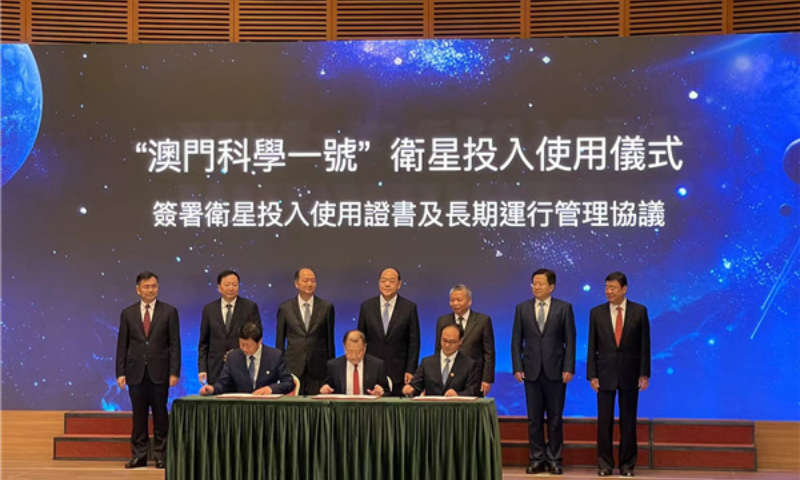
Photo: People.cn
The Macao Science-1 satellite, China's first high-precision geomagnetic field detection satellite, was put into operation on Tuesday. Jointly carried out by the China National Space Administration (CNSA) and the Macao Special Administrative Region (SAR) government, the satellite project has pioneered a new model for technological innovation cooperation in the Guangdong-Hong Kong-Macao Greater Bay Area, and will significantly elevate the country's proficiency in space magnetic field detection technology.
An inauguration ceremony was held Tuesday in Macao signaling the satellite's official launch, the CNSA announced on its website.
Macao's chief executive Ho Iat Seng, along with Zheng Xincong, director of the central government's liaison office in Macao, and Zhang Kejian, head of the CNSA, attended the ceremony.
Offering the highest precision in detecting the Earth's magnetic field, the satellite also carries great significance in accelerating Macao's transformation in economic and social development and augmenting its influence in both domestic and international scientific and technological fields, the CNSA said.
A twin-satellite approach has been taken, in which Star A carries payloads including high-precision magnetometers to detect Earth's magnetic field, while Star B is equipped with payloads like high-energy particle detectors and solar X-ray instruments to obtain solar X-ray data and energetic particles within Earth's radiation belts. The two will work to jointly conduct observations on the spatiotemporal distribution of high-energy particles in the South Atlantic Anomaly region.
During in-orbit testing, the Macao Science-1 operated steadily, with all functionalities and performance meeting its engineering test plan. In November, the satellite successfully completed its in-orbit testing, meeting the requirements for operational deployment.
Leveraging Macao's unique geographical positioning and institutional advantages, this project encourages open sharing and application of scientific data, the CNSA said, and it aims to deepen collaboration between Macao, the Chinese mainland, and the international community. Meanwhile, it will continue to promote aerospace scientific research and space knowledge popularization among young people in the region.
During an exclusive interview with the Global Times, the satellite's chief scientist Zhang Keke said his team has signed agreements to jointly conduct research on the satellite with 18 top research institutes from around the world, including ones from France, the US, the UK, and Germany.
"Westerners came to us, not the other way around," the expert said, noting that the previous high-precision Earth magnetic field measurement satellites have been polar satellites, mainly measuring the changes in physical parameters from the South Pole to the North Pole, while
the Macao Science-1 has filled in a gap for east-west directions.
Elaborating on the importance of studying Earth's magnetic field, Zhang said that it not only provides a protective shield that blocks high-energy charged particles from the Sun from entering the atmosphere, but applies to almost every area of human beings' daily lives.




